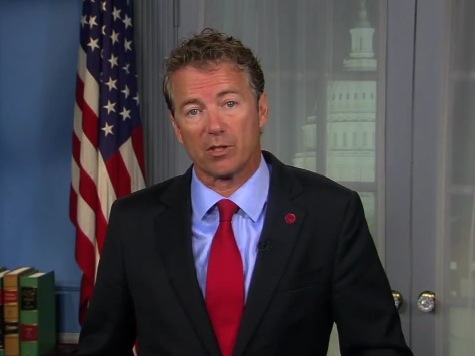Sen. Rand Paul (R-KY), delivering a prepared rebuttal to President Barack Obama’s address to the nation on the Syria crisis Tuesday night, said that only opposition to war had made a diplomatic solution possible.
It was the mirror image of the claim made by President Obama on Monday that only the threat of war had made the Syrian regime eager to accept a proposal for international monitoring of its chemical weapons.
Paul added a note of caution about the Russian-backed plan, which emerged a “goof” by Secretary of State John Kerry on Monday. “Can we trust the participants in this plan? Diplomacy is always a mixture of trust, distrust, and watchfulness. We should not be naïve, and we should have a solid plan and safeguards in place as part of any solution.”
“As Reagan put it we must “trust, but verify,” Paul added, echoing Obama himself.
With Tuesday night’s address, Paul, who is an early presidential contender for 2016, continued a practice of giving alternative responses to presidential speeches outside of the official response of the Republican Party, which declined to offer its own rebuttal last night.
Time magazine covered the speech by mocking it: “What You Missed By Not Watching Rand Paul’s Response to Obama’s Speech on Syria” was its headline.
Paul reiterated many familiar arguments against attacking Syria. “Americans by a large majority want nothing to do with the Syrian civil war,” he said. “We fail to see a national security interest in a war between a leader who gasses his own citizens and Islamic rebels who are killing Christians.”
As for the question of America’s credibility, Paul retorted: “I would argue that America’s credibility does not reside in one man.”
Those who doubted America’s resolve, he said, need only look at the U.S. response to the terror attacks of September 11, 2001. “When attacked, we responded with overwhelming force and with the military objective of complete victory over our attackers.”
Paul did not address questions about whether that victory was, in fact, “complete,” with the resurgence of the Taliban in Afghanistan and the spread of Al-Qaeda beyond.
In addition, Paul declined to address broader strategic concerns in the region, such as the threat of Iran or the growing influence of Russia.
Instead, he focused his argument on the question of war itself, explaining his view that the power to “initiate war” does not belong to the president under the U.S. constitution, but to Congress, and stating his view that war was not justified “unless a compelling American interest is present.”

COMMENTS
Please let us know if you're having issues with commenting.